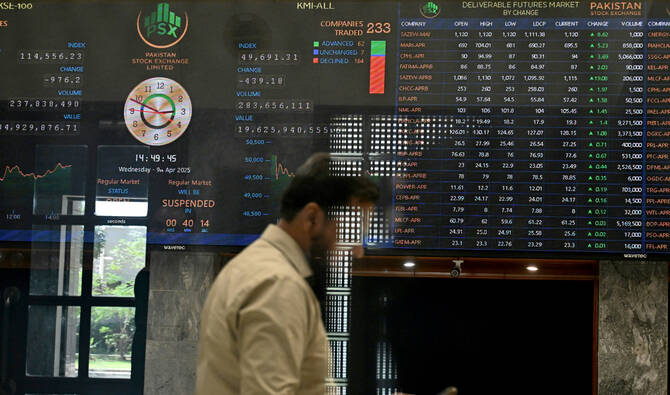ISLAMABAD: The Utility Stores Corporation (USC) employees’ union on Thursday vowed to resist the government’s decision to shut down retail operations by July 10, saying it would fight for the rights of over 11,000 workers by initiating protests, sit-ins and legal action.
Established by the government in 1971, the corporation has a nationwide chain of retail outlets that provide essential commodities to the general public at prices lower than those in the open market.
The corporation took over 20 retail outlets at the beginning but now operates 6,000 stores across the country. The government allocated Rs65 billion ($229.7 million) to subsidize the products sold by the retail chain in the last fiscal year.
One of its spokespersons confirmed to Arab News the corporation’s public retail stores will be closed by July 10, adding that all operations will shut down by the end of the month.
“We have received instructions from the Ministry of Industries and Production to close down all the stores by July 10, shift remaining goods to warehouses and completely shut down operations by July 31, 2025,” Sajid Marwat, USC Public Relations Officer, said.
Meanwhile, Arif Shah, Secretary General of the All Pakistan Workers Alliance of Utility Stores, said the union will use all available avenues to protect the corporation and its employees.
“We will pursue both options, challenging the decision in court and staging on-ground protests including a sit-in at the [USC] headquarters,” he told Arab News.
“In total, around 17,000 people — including 11,500 direct employees of Utility Stores, 2,000 to 2,500 vendor staff and 3,000 franchise store workers from 1,000 to 1,200 outlets — will be affected by the closure,” Shah said, adding the authorities had already terminated around 4,100 employees.
He maintained the institution has remained in existence for 55 years, and shutting it down was not the government’s sole prerogative.
“If it is truly necessary to close this institution, the decision should be approved by parliament,” he said.
Shah noted that during emergencies and disasters, the corporation stood at the forefront to provide relief items and ensure food security due to its big presence all over the country.
He pointed out if the government was determined to shut it down, then at the very least, the employees should be given a fair and respectable voluntary separation scheme (VSS) package to help absorb the financial shock.
Asked about the possibility of offering such a proposal, USC spokesperson Marwat said a human resource committee would convene on Friday to review the issue in consultation with union representatives and the management.
“The union is not accepting the current terms as they are demanding compensation packages for everyone, including daily wage laborers and contractual staff, as all categories of workers are being affected,” he informed, adding that the government was considering a financial deal for regular employees.
Under the package for regular staff, the government is planning to offer two or three month of basic salary.
“But based on mutual consultations, the committee will prepare a comprehensive package for the outgoing employees,” he added.
Raja Miskeen, a USC employee for over two decades, termed it completely wrong to shut down Utility Stores, saying it would put the livelihood of thousands of employees like him and their families at risk.
“We are waiting for the official written order, after which we will challenge this move in court,” he told Arab News.
“We are also in contact with our unions, urging them to develop a joint strategy that includes protests, sit-ins in the federal capital and legal action,” he added.
Miskeen said the employees have dedicated many years to the corporation, adding that it had been functioning well.
“We are not against restructuring or improving its operations, but a complete shutdown is simply unacceptable,” he added.
Ayesha Anwar, a regular customer at the USC in Islamabad’s G-6 sector, said she had been shopping at Utility Stores for years, as their quality goods and subsidized rates had always helped stretch her household budget.
“Sugar at the store costs Rs164 per kilogram [$0.58], while in the open market it is around Rs200 [$0.71]. Similarly, price differences exist for other essential items as well,” she said, adding that closure of these stores would deeply affect the public, especially low-income families.
















